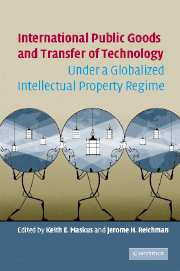Book contents
- Frontmatter
- Contents
- List of contributors
- Preface
- PART I International Provision of Public Goods under a Globalized Intellectual Property Regime
- PART II Innovation and Technology Transfer in a Protectionist Environment
- PART III Sectoral Issues: Essential Medicines and Traditional Knowledge
- 15 Managing the Hydra: The Herculean Task of Ensuring Access to Essential Medicines
- 16 Theory and Implementation of Differential Pricing for Pharmaceuticals
- 17 Increasing R&D Incentives for Neglected Diseases: Lessons from the Orphan Drug Act
- Comment: Access to Essential Medicines – Promoting Human Rights Over Free Trade and Intellectual Property Claims
- 18 Legal and Economic Aspects of Traditional Knowledge
- 19 Saving the Village: Conserving Jurisprudential Diversity in the International Protection of Traditional Knowledge
- 20 Legal Perspectives on Traditional Knowledge: The Case for Intellectual Property Protection
- Comment: Traditional Knowledge, Folklore and the Case for Benign Neglect
- 21 Protecting Cultural Industries to Promote Cultural Diversity: Dilemmas for International Policymaking Posed by the Recognition of Traditional Knowledge
- PART IV Reform and Regulation Issues
- Index
Comment: Access to Essential Medicines – Promoting Human Rights Over Free Trade and Intellectual Property Claims
Published online by Cambridge University Press: 05 May 2010
- Frontmatter
- Contents
- List of contributors
- Preface
- PART I International Provision of Public Goods under a Globalized Intellectual Property Regime
- PART II Innovation and Technology Transfer in a Protectionist Environment
- PART III Sectoral Issues: Essential Medicines and Traditional Knowledge
- 15 Managing the Hydra: The Herculean Task of Ensuring Access to Essential Medicines
- 16 Theory and Implementation of Differential Pricing for Pharmaceuticals
- 17 Increasing R&D Incentives for Neglected Diseases: Lessons from the Orphan Drug Act
- Comment: Access to Essential Medicines – Promoting Human Rights Over Free Trade and Intellectual Property Claims
- 18 Legal and Economic Aspects of Traditional Knowledge
- 19 Saving the Village: Conserving Jurisprudential Diversity in the International Protection of Traditional Knowledge
- 20 Legal Perspectives on Traditional Knowledge: The Case for Intellectual Property Protection
- Comment: Traditional Knowledge, Folklore and the Case for Benign Neglect
- 21 Protecting Cultural Industries to Promote Cultural Diversity: Dilemmas for International Policymaking Posed by the Recognition of Traditional Knowledge
- PART IV Reform and Regulation Issues
- Index
Summary
Introduction
Over the past five years, there has been an intense international debate, negotiations at the World Trade Organization (WTO) and a variety of political and legal struggles in various jurisdictions over access to affordable medicines in developing countries. Until recently, the debate focused on the ability of the existing medical infrastructure to address the HIV/AIDS pandemic; but more recently the focus has shifted to questioning whether the heightened patent protection of the TRIPS Agreement allows countries sufficient flexibility to deal with domestic health crises. This question has been increasingly driven by the impact of the global HIV/AIDS pandemic and the threat it poses to economic and political stability, particularly in Africa, and it has motivated two new WTO agreements – at Doha and just before Cancun – aimed at providing flexibility under the terms of the TRIPS Agreement. Most recently, the World Health Organization (WHO), which has been at the forefront of these negotiations, declared that the “failure to deliver AIDS drugs to impoverished people is so grave that it has become a global health emergency.” With thousands of people dying each day, the question of access to affordable medicines can no longer be treated as a predominately intellectual property or trade-related issue. Rather, it requires the assertion of a human rights perspective to facilitate access to public goods, particularly when dealing with rights to the knowledge required to produce medicines that combat life-threatening diseases.
Placing public health – in this case the global HIV/AIDS pandemic – at the center of this debate exposes the inherent tensions between the law and policies affecting free trade, intellectual property rights, development, and public health.
- Type
- Chapter
- Information
- International Public Goods and Transfer of Technology Under a Globalized Intellectual Property Regime , pp. 481 - 492Publisher: Cambridge University PressPrint publication year: 2005
- 1
- Cited by



